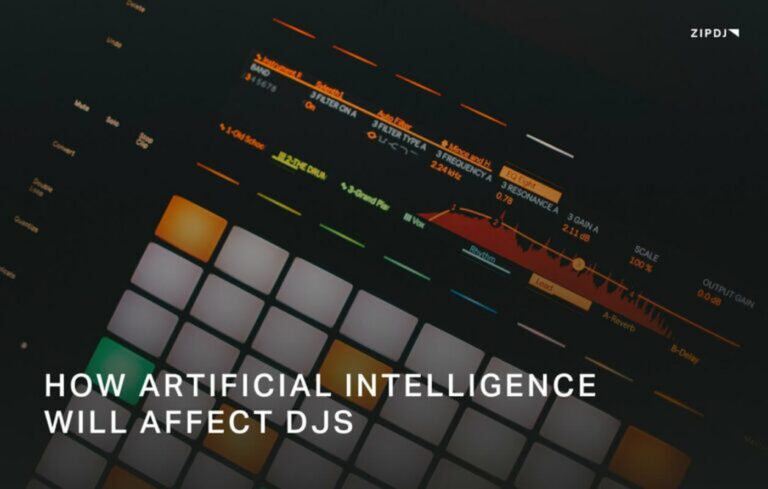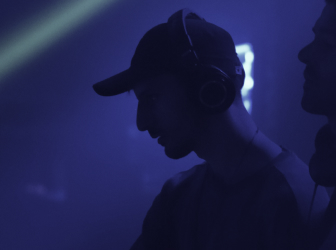How Artificial Intelligence In Music Will Affect DJs In 2024

The rise of ChatGPT and other powerful artificial intelligence tools is rapidly reshaping how creative industries operate, and the music industry is no exception.
These developments are changing how people create music, questioning the nature of human creativity and its interaction with technology.
Continue reading, and we’ll discuss how these powerful AI tools impact how DJs plan and perform their sets.

How Artificial Intelligence In Music Will Affect DJs In 2024
The use of artificial intelligence in the music industry is becoming increasingly prevalent, affecting everything from the quality of mixes to running a DJ business.
We’ve covered the various ways DJs can capitalize on artificial intelligence, using it to curate music to help them avoid basic mixing mistakes.
Without further ado, let’s break down the various ways artificial intelligence will affect the way DJs work:
1. Save Time Selecting Music
DJs often work with colossal music archives, and finding the time to curate tracks for a set ahead of time isn’t always possible.
Artificial intelligence can help with this by deploying algorithms to make intelligent song selections across the music industry without the DJ’s input.
This allows DJs to focus their time and mental energy on delivering fun and creative mixes by lining up the most relevant music from their DJ pool or library.
Anyone who has used Spotify will know the benefits of algorithms for curating playlists tailored to the user’s tastes and listening habits.
Artificial intelligence also can scour the best DJ websites instantly, using this information to fine-tune the music it recommends.
2. Finding The Right Track
A common problem most people will have experienced at some point in their lives is struggling to find the right track when they cannot recall the title or artist.
Often, there is only a vague definition, such as a combination of lyrics and a specific instrument, along with a descriptor such as “it’s an uplifting funky house tune.”
AI tools can search for tracks based on such vague definitions using a machine learning system that matches the music in a given library to these descriptors.
The result is a far more precise search system that goes way beyond simply looking for artists and music genres and into specific track attributes DJs require for their sets.
3. Suggesting Current Trends
Scouring the internet for relevant new releases and the latest hit songs is another time-consuming aspect of being a DJ.
With thousands of record labels releasing a stream of new content, there isn’t enough time in the day to review it all and pick the best tracks for your sets.
Some DJs use a DJ pool as a time-saving measure since these pools offer carefully curated content tailored to the user’s tastes.
Artificial intelligence assists DJ pools in this curation, working closely with the leading labels in the music industry to deliver top-tier content.
In short, artificial intelligence will become a powerful tool DJs use to get unreleased music without spending hours listening to new tracks.
4. Lining Up Tracks By Mood
Compiling themed playlists based on given parameters and previous sets is another way AI will impact the DJing experience.
Some record pools are already ahead of the curve in this respect since they offer information on the mood that complements genre, tempo, and other track information.
Mood categorizations are more nuanced, allowing DJs to quickly compile sets that might span different genres and styles but mix well together.
Using this data, AI music software for DJs will allow users to instantly generate highly personalized playlists for everything from DJing a wedding to underground techno mixes.
Such tools can be handy for professional DJs who jump around between genres and play for a range of audiences that demand their own tone and mood.
5. Avoiding Mixing Mistakes
Even the best DJs make mistakes while mixing, but AI tools will become a great way to ensure these are more easily avoided.
Some common causes for mixing mistakes, such as a lack of familiarity with the music, feeling tired, or being distracted, can quickly spoil a set.
Artificial intelligence technology is immune to all of these circumstances thanks to a range of automix functions that allow for the creation of seamlessly blended tracks.
Such tools can complement a human performer, correcting their mixing mistakes without completely taking over the process.
DJs who are still learning to master easy DJ transitions can utilize the power of artificial intelligence to smooth over any mistakes they make.

6. Automatically EQing Mixes
AI will have the power to not only step in when a DJ makes a mistake and rectify the problem but also fully automate EQing and mixing.
While the implications of this on the human creative process raise some cause for concern, such artificial intelligence tools will have a place for bulk content creation.
Such AI-powered music technology will be capable of taking a set track listing and transforming it into a fully mixed set, ready to upload online.
As a tool for learning the basics of mixing, such as beat matching, automatically EQing can help beginners to focus on the core skills needed to DJ.
Professional DJs will largely avoid tools that override the creative aspect of performance, but labels looking to generate mixes showcasing their talent may find them incredibly useful.
7. Isolating Specific Track Elements
Artificial intelligence has the ability to do more than simply recognize and match BPM and pitch; it can also be used to isolate specific track elements.
Drums, vocals, instruments, and other components of a given track can be identified by AI tools and pulled out for independent use.
These elements can then be used to enhance live sets by inputting them into a controller as samples that can be manipulated in real-time.
This will bring a broad range of benefits to DJs, for example, allowing them to isolate their favorite vocal sample and use it to learn how to scratch DJ or as an acapella.
Identifying and altering the vocals can also be a great way to ensure the tunes being mixed match harmonically, allowing DJs to put together more professional-sounding sets.
8. Reaching A Target Audience
For DJs who post their mixes online or want to promote their music, AI can help them to identify and reach their target audience online clearly.
Apps such as Spotify and Apple Music already use machine learning and deep learning algorithms to tailor content to their customers’ listening patterns.
DJs can use these same tools to help push their live sets and mixes to the best streaming services that reflect their musical styles.
Data on demographics, listening habits, and closely related artists potential listeners follow can help DJs drive their business strategy and online presence.
It can also be used to focus marketing drives and other efforts to reach a target audience on the social media websites likely to deliver the best results.
9. Automating The DJ Workflow
Ultimately, AI algorithms are becoming increasingly integral to all aspects of a DJ’s workflow to save valuable time on a wide range of processes.
It can be used for automatically tagging and categorizing music catalogs, going well beyond the basics of BPM and artist information, as with the inclusion of mood tags.
This automation doesn’t end with the ability to compile bespoke playlists of new releases that are pre-defined to work together in a DJ set.
It extends to all aspects of running a DJ business, pushing new sets across social media platforms, and helping DJs increase their overall revenue streams.
10. Integrating With Production Software
We’ve explored how AI in music can help isolate elements of a track to be used in mixes, but this tool can also be used by DJs who are making music of their own.
Melodies, chord changes, and other track elements can be isolated using AI tools, then imported into music production software for edits and remixes.
This can include converting this information into easy-to-use MIDI files and other languages that are familiar to production and mastering platforms.
By bringing this AI-generated data into composition apps, it can be used to complement manual production and save time and effort.
While the role of AI with regard to original music is uncertain, for remixes and edits, these tools will provide an advantage for DJs/producers looking to create new content.
FAQs About Artificial Intelligence In Music
We’ve covered a broad selection of ways artificial intelligence and music are going to interact in 2024 and how this will affect DJs.
If you still have questions or concerns about the impact this will have, check out the answers to these frequently asked questions.
Q1: How Is AI Music Created?
AI music is created by scouring a vast multitude of sources for data, which it then analyzes to construct a convincing model of the music style it seeks to emulate.
This search for data is coordinated with parameters established via human input, which links to machine learning that detects patterns that help it to create new music.
Mood, tempo, genre, and other parameters, such as desired instruments and vocal styles, can be used by AI to compose new songs in a matter of seconds.
Q2: Can Artificial Intelligence Write Music?
There are a number of AI music generators that allow users to compose new music by inputting variables that are used to put a composition together.
Many of these tools also include algorithms that ensure there are no issues with licensing, delivering rights-free music generation for use online.
While the quality of the music generated by AI is open to debate, these tools continue to evolve and improve to create higher-quality music.
Q3: What Is The Problem With AI In Music?
While AI has advanced in a relatively short space of time and brings a range of benefits to DJing, there are still some teething problems to consider.
Algorithms can take time to learn the personal preferences of the user inputting the parameters, and until it has enough data can deliver irrelevant results.
It also lacks the capacity to read the crowd like a human DJ can, whereas an experienced DJ can have an intuitive sense of what song will work best.
Perhaps the biggest fear for musicians and people who make a living from music composition is that AI will eventually replace them and render them obsolete.
Q4: Is AI The Future Of Music?
Artificial intelligence has already established a firm foothold in the music industry, and its impact is set to continue to increase as the computer science behind it evolves.
Many artists already use resources such as record pools to acquire their music, which often utilizes AI-based algorithms to help users get the best possible experience.
Likewise, record labels are already heavily invested in AI-based tools that allow them to track and analyze human behaviors and preferences, making better recommendations for content.
While the degree to which AI will eventually integrate into all aspects of DJing and the industry at large is yet to be seen, there’s no doubt it’s here to stay.
Summary
That concludes this overview of the future of artificial intelligence and its impact on DJing in the coming years.
While the technology is still in its infancy, AI has profoundly affected the music industry, from audio processing to playlist curation.
With corporations investing significant sums of money in developing the technology, it’s likely to affect DJs in unforeseen ways as its evolution continues.
Not a member ?
Join Today for Unlimited Music Downloads. Visit zipdj.com for more information.



